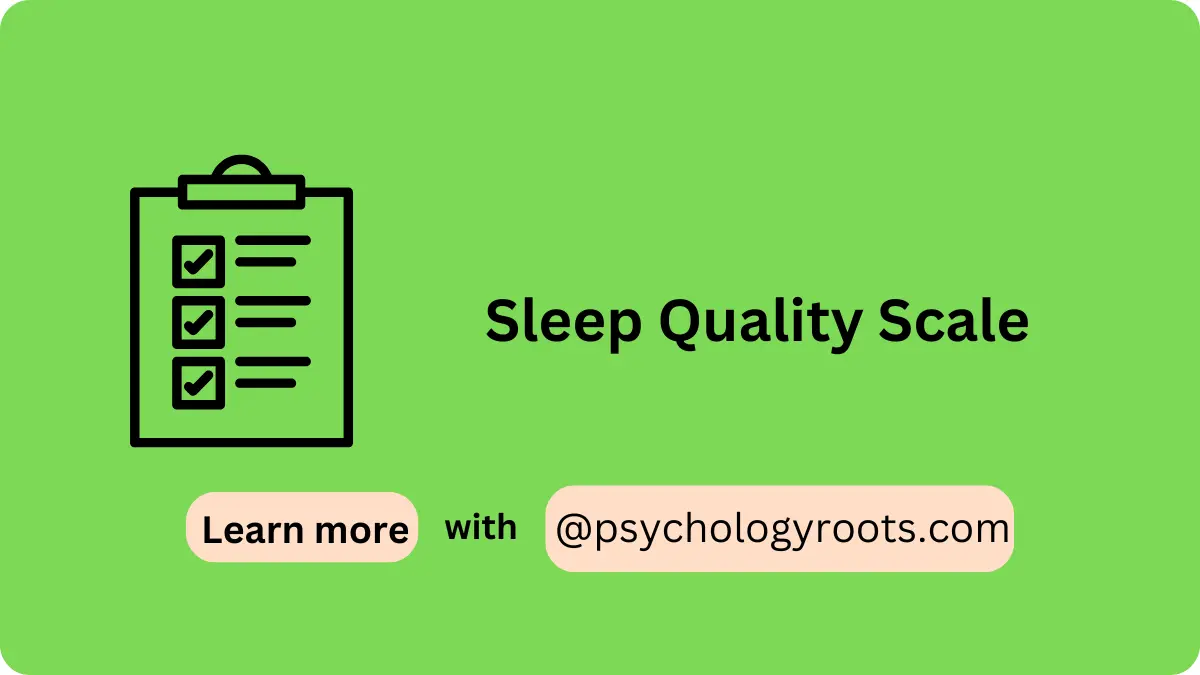Table of Contents
Sleep Quality Scale
Here in this post, we are sharing the “Sleep Quality Scale”. You can read psychometric and Author information. We have thousands of Scales and questionnaires in our collection (See Scales and Questionnaires). You can demand us any scale and questionnaires related to psychology through our community, and we will provide you with a short time. Keep visiting Psychology Roots.
About Sleep Quality Scale
Scale Name
Sleep Quality Scale
Author Details
Hyeryeon Yi, Kyungrim Shin, Chol Shin
Translation Availability

Background/Description
The Sleep Quality Scale (SQS) was developed by Yi, Shin, and Shin (2006) to comprehensively measure sleep quality among individuals. Unlike many brief sleep quality assessments, the SQS includes a broad range of factors related to sleep, such as sleep duration, sleep latency, sleep disturbances, and overall feelings of restoration upon waking. This scale allows researchers and clinicians to gain a deeper understanding of individuals’ sleep patterns and any issues they may experience in achieving restful, high-quality sleep.
The development of the SQS addresses the growing recognition of sleep disorders and poor sleep quality as major health concerns, often linked with mental health disorders, physical ailments, and diminished quality of life. Sleep quality has also been shown to impact emotional regulation, cognitive function, and overall wellbeing, making reliable and valid measurement tools like the SQS critical in sleep research and clinical settings.
Administration, Scoring and Interpretation
The SQS consists of 28 items rated on a 4-point Likert scale, ranging from 1 (strongly disagree) to 4 (strongly agree). The scale takes approximately 5-10 minutes to complete.
Reliability and Validity
The Sleep Quality Scale (SQS) has demonstrated strong reliability and validity in research. In its development, Yi et al. (2006) confirmed the tool’s internal consistency, with Cronbach’s alpha coefficients for the six factors ranging from 0.77 to 0.85. The overall scale showed excellent reliability and was tested against other established measures of sleep quality, showing good construct validity.
The SQS has been used in a variety of populations and is regarded as a reliable tool for assessing subjective sleep quality across different age groups and clinical populations.
Available Versions
Multiple-Items
Reference
Yi, H., Shin, K., & Shin, C. (2006). Development of the sleep quality scale. Journal of sleep research, 15(3), 309-316.
Important Link
Scale File:
Frequently Asked Questions
What does the Sleep Quality Scale measure?
The SQS measures overall sleep quality by assessing six different dimensions of sleep: disturbances, satisfaction, restoration, waking difficulty, latency, and duration.
Who can use the Sleep Quality Scale?
The SQS is suitable for use by clinicians, researchers, and healthcare professionals assessing sleep quality in both general and clinical populations.
How is the SQS different from other sleep scales?
The SQS provides a more comprehensive assessment of sleep quality, measuring multiple factors beyond just duration and latency, such as satisfaction and difficulty waking.
How long does it take to complete the SQS?
It typically takes between 5 to 10 minutes to complete the 28 items on the scale.
What is the scoring method for the SQS?
Each item is rated on a 4-point Likert scale, and scores are summed to create an overall measure of sleep quality.
Disclaimer
Please note that Psychology Roots does not have the right to grant permission for the use of any psychological scales or assessments listed on its website. To use any scale or assessment, you must obtain permission directly from the author or translator of the tool. Psychology Roots provides information about various tools and their administration procedures, but it is your responsibility to obtain proper permissions before using any scale or assessment. If you need further information about an author’s contact details, please submit a query to the Psychology Roots team.
Help Us Improve This Article
Have you discovered an inaccuracy? We put out great effort to give accurate and scientifically trustworthy information to our readers. Please notify us if you discover any typographical or grammatical errors.
Make a comment. We acknowledge and appreciate your efforts.
Share With Us
If you have any scale or any material related to psychology kindly share it with us at psychologyroots@gmail.com. We help others on behalf of you.